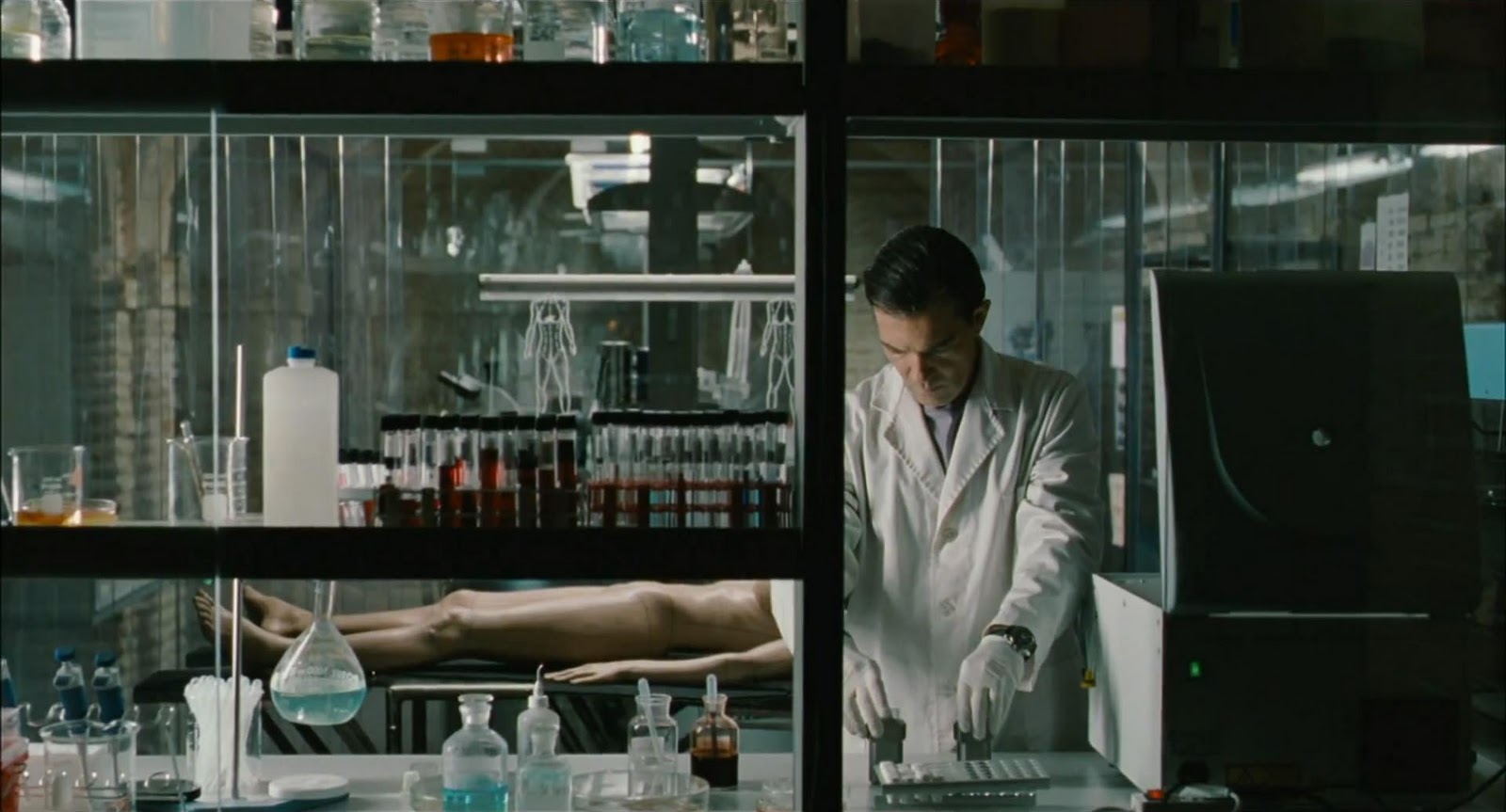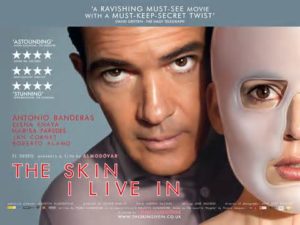A rare attempt at genre filmmaking by Spain’s Pedro Almodovar, who provides a visually ravishing exercise in Cronenbergian horror. The Skin I Live In has some flaws, but must be counted as Almodovar’s finest and most daring work in years, if not decades.
Almodovar’s finest and most daring work in years, if not decades.
The basis of this 2011 film (a.k.a. LA PIEL QUE HABITO) was Thierry Jonquet’s 1999 novel TARANTULA, a concentrated exercise in noirish horror that Almodovar spent a reported 10 years adapting. The film marked the commencement of Almodovar’s fourth decade as a filmmaker (an extremely overrated one in my view), and received the expected volley of film festival awards and critical acclaim.
Dr. Robert Ledgard is a plastic surgeon specializing in facial transplantation. The beautiful Vera, who spends her days lounging around Robert’s mansion in full-body stockings doing yoga, is the guinea pig in Robert’s latest and grandest experiment: the creation of an artificial skin. Yet Robert’s live-in servant, the middle-aged Marilia, disapproves and threatens to walk off the job.

Marilia in any event has other concerns: her heavily scarred son Zeca has showed up at Robert’s house. Upon seeing Vera, Zeca mistakes her for his wife, who was maimed in a fiery car crash—Robert, we learn, snatched Zeca’s wife from the jaws of death and attempted to nurse her back to health, but upon catching sight of her hideously burned skin the woman promptly committed suicide. When Zeca tries to rape Vera Robert kills him and disposes of his corpse. We also learn that Marilia is actually Robert’s mother, a fact she’s kept secret for decades.
At this point the film flashes back six years to a party attended by Robert. There his daughter Norma is raped by a young criminal—who unbeknownst to Robert is his own brother. Robert catches the criminal and takes him back to his house. There he locks the guy in his basement and surgically transforms him into Vera. The operation is not without difficulties, as when Vera rebels against her fate and tries to commit suicide, but it’s pulled off with startling success.
Yet Vera’s former identity isn’t entirely subsumed, and Marilia is still searching for her lost son. Obviously this means trouble for Robert, whose carefully ordered world is about to come crashing down…
First and foremost, this film looks spectacular with its impeccably measured visual compositions, arrestingly clinical settings and gorgeous co-star Elena Anya, whose physical perfection renders her entirely convincing as a woman possessing “the best skin in the world.” The aura of elegant perversity is enhanced by the unnerving violin music of Alberto Iglesias and an uncharacteristically subdued—and all the more powerful for it—lead performance by Antonio Banderas.
The aura of elegant perversity is enhanced by the unnerving violin music of Alberto Iglesias and an uncharacteristically subdued—and all the more powerful for it—lead performance by Antonio Banderas.
Unfortunately Pedro Almodovar can’t refrain from adding the sort of black humored flamboyance that typifies his best-known films (WOMEN ON THE VERGE OF A NERVOUS BREAKDOWN, ALL ABOUT MY MOTHER, VOLVER, etc.) in the form of a character dressed as a faux leopard, a subplot involving a retro clothing store and a very soap opera-like narrative arc that wasn’t in the source novel. About that narrative, it’s appealingly multifaceted yet seemed to me a bit overly convoluted—the aforementioned leopard man, for instance, shows up only to a). be killed, and b). add a gratuitous car accident subplot.
Nonetheless, Almodovar is to be commended for his audacity in a film whose grossness and perversity doubtless turned off a large portion of his upscale fan base. All the better, I say!
Vital Statistics
THE SKIN I LIVE IN (LA PIEL QUE HABITO)
Sony Pictures Classics/El Deseo
Director: Pedro Almodovar
Producer: Esther Garcia, Agustin Almodovar
Screenplay: Pedro Almodovar, Agustin Almodovar
(Based on a novel by Thierry Jonquet)
Cinematography: Jose Luis Alcaine
Editing: Jose Salcedo
Cast: Antonio Banderas, Elena Anaya, Marisa Paredes, Jan Cornet, Roberto Alamo, Eduard Fernandez, Jose Luis Gomez, Blanca Suarez, Susi Sanchez, Barbara Lennie, Fernando Cayo

